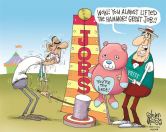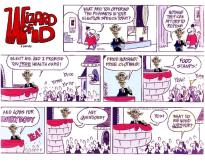Washington is in the middle of another debate about redistributing money.
But that’s hardly newsworthy. Politics, after all, is basically a never-ending racket in which insiders buy votes and accumulate power with other people’s money.
 The current debate about extending unemployment benefits is remarkable, though (at least from an economic perspective), because certain politicians want to give people money on the condition that they don’t get a job. Needless to say, that leads to a very perverse incentive structure.
The current debate about extending unemployment benefits is remarkable, though (at least from an economic perspective), because certain politicians want to give people money on the condition that they don’t get a job. Needless to say, that leads to a very perverse incentive structure.
There is a problem with joblessness, to be sure, but it’s misguided to think that extending unemployment benefits is the compassionate response.
Senator Paul and I wrote a column for USA Today about a better way of helping the unemployed. Looking at the empirical evidence, we argue that it’s time to unleash the private sector by reducing the burden of government.
We started with an assessment of the labor market, which has been dismal under Obama’s reign.
The nation is enduring the weakest recovery since the Great Depression, 11 million people remain unemployed, and millions more have dropped out of the labor force. For minorities, it’s even worse. The black unemployment rate is more than twice that of whites. And the weak job market means that even those who are employed are having a hard time climbing the economic ladder.
We explain that more unemployment benefits is a misguided approach.
There’s a lot of talk about helping those down on their luck, but there’s a big divide on the best approach. Our view is that America needs a growth agenda based on reducing the burden of government. The unemployed need a strong job market, not endless handouts that create dependency. …There’s an understandable desire in Washington to “do something,” and extending benefits once again certainly is the easy route for policy makers. But if we are serious about keeping workers out of the long-term unemployment trap, we must have a debate about which policies cause unemployment and which policies create jobs.
Recommended
The column cites many of the academic studies showing that unemployment benefits lead to more joblessness.
I’ve made this point during television interviews, and this Michael Ramirez cartoon echoes our thinking in a more entertaining fashion.
 And we definitely can’t overlook this superb Wizard-of-Id parody. It doesn’t focus specifically on unemployment benefits, but it makes a great point about labor supply incentives.
And we definitely can’t overlook this superb Wizard-of-Id parody. It doesn’t focus specifically on unemployment benefits, but it makes a great point about labor supply incentives.
But let’s get back to the column. Our main goal is to identify the types of policies that would generate jobs and growth.
Simply stated, genuine compassion should be defined by helping people get back to work so they don’t need to be wards of the state.
And easing the burden of government is the best way to make that happen. Our column looks at some evidence – from both overseas and here at home – about the policies that are associated with better economic performance.
Big government is responsible for today’s unemployment situation. …Since President Obama was elected, we have spent $560 billion on unemployment benefits. It’s likely many more jobs would have been created had the government not diverted that money from the economy’s productive sector. …Instead of copying stagnant European nations with bigger public sectors, we should learn from countries that have achieved better performance by lowering the burden of government. Singapore and Hong Kong are examples of jurisdictions with small governments and free markets that enjoy strong and sustained growth with very low levels of joblessness. …look at Canada, which has significantly boosted its jobs market with pro-growth reforms, or Switzerland, which has cemented its traditionally strong labor markets with reforms to control the growth of government. This is not a partisan argument. Or at least it shouldn’t be. The United States enjoyed strong levels of job creation during both the Reagan and Clinton years. But in both cases, public policy was largely the same, featuring an increase in economic freedom.
Some people may wonder whether Reagan and Clinton belong in the same category.
 Well, as illustrated by this chart, they both presided over periods with impressive job creation.
Well, as illustrated by this chart, they both presided over periods with impressive job creation.
And they both presided over periods with generally good economic policy.
Reagan moved the country in the right direction on purpose. Clinton, by contrast, may have wanted to move the nation in the other direction, but he was unsuccessful. Indeed, the evidence is very strong that the overall burden of government fell during his tenure.
Indeed, the evidence is very strong that the overall burden of government fell during his tenure.
Whether by accident or design, America needs another period of free markets and shrinking government.
For further details on the recipe for good policy, here’s the video I narrated for the Center for Freedom and Prosperity, which explains the conditions that lead to strong and sustained growth.
P.S. I’m obviously a fan of Senator Rand Paul. Not only does he choose good people as op-ed partners, he also gave me public credit for a good Obamacare joke.
P.P.S. On a separate topic, I wrote in December 2012 that the strongest evidence for media bias is which stories get covered. A perfect example is that journalists already have given 17 times as much coverage of the Chris Christie “bridgegate” scandal as they gave to the IRS scandal over the past six months.

























Join the conversation as a VIP Member